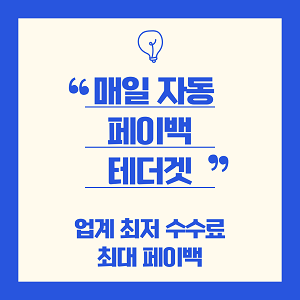셀퍼럴✅️테더겟✅️ 비트마트 셀퍼럴 최대 80% 페이백 혜택 최저 수수료 제공
페이지 정보
작성자 배액프로 작성일25-04-30 02:08 조회5회 댓글0건관련링크
본문
TARGET은 암호화폐 거래소 이용 시 테더 페이백 혜택을 주는 셀퍼럴 플랫폼입니다.
특징
1. 테더(USDT)로 직접 리워드 제공
2. 여러 글로벌 거래소와 제휴
3. 간편한 가입
4. 대시보드를 통한 지급 확인 가능
5. 추천 수익 추가 제공
장점
1. 현금성 자산 테더 지급
2. 트레이딩 수수료 절감
3. 자동 누적 지급
4. 활동 없이 수익 발생 가능
5. 공식 이벤트 외에도 추가 보상
이용자 후기
1. "수수료가 아깝지 않게 페이백 받아서 만족합니다."
– 윤성우, MEXC 이용자
2. "친구랑 같이 가입했는데 둘 다 혜택 봤어요."
– 박소윤, MEXC 이용자
3. "테더겟 덕분에 거래하는 재미가 늘었어요."
– 황지은, MEXC 트레이더
Bitcoin 셀퍼럴 시스템은 자기 자신을 추천인으로 지정해 보상을 받는 구조를 뜻한다. 이는 암호화폐 관련 서비스에서 운영하는 추천 시스템을 변형하거나 악용하는 형태로, 자신이 만든 추천 코드를 여러 계정에 사용하는 등 여러 계정을 통해 이익을 얻으려는 행위이다.
기존의 추천 시스템은 기존 회원이 신규 회원을 초대하면 리워드를 얻을 수 있지만, 셀퍼럴은 한 명의 유저가 복수 계정을 이용해 보상을 늘리려는 시도로, 분류된다.
대부분의 플랫폼에서는 이러한 행위를 정책 위반으로 간주하며, 계정 정지나 보상 회수 등의 제재를 취하기도 한다. 이유는 셀퍼럴이 건전한 유저 유입 구조를 무너뜨리며, 비정상적인 유저 활동을 유도하기 때문이다.
이에 따라, 일부 플랫폼은 이를 방지하기 위해 휴대폰 인증, KYC(고객 인증), IP 추적 등을 도입하고 있다. 결과적으로, 윤리적이고 합법적인 방법이 보다 안정적인 방식이라 할 수 있다.
암호화폐 수수료 환급 서비스는 암호화폐 거래 시 발생하는 수수료의 일부를 사용자에게 돌려주는 서비스입니다.
이런 방식은 플랫폼을 통해 특정 거래소와 연결되어 제공되며, 사용자들은 플랫폼을 통해 거래를 진행하면 수수료의 일부를 돌려받을 수 있습니다.
---
코인 페이백 서비스란?
암호화폐 거래소에서 코인을 사고팔 때 발생하는 수수료는 누적되면 부담이 될 수 있습니다. 이를 줄이기 위해 등장한 것이 바로 페이백 서비스입니다.
이 시스템은 지불한 수수료 중 일정 비율을 사용자에게 코인 형태로 환급해주며, 실질적인 투자 비용을 줄일 수 있도록 돕습니다.
---
주요 페이백 서비스
1. 테더겟
- 제휴 거래소: 비트겟
- 페이백 비율: 최대 70% 환급
- 특징:
- 간편한 회원가입과 UID 연동으로 손쉽게 수수료 환급
- 실시간 내역 확인 및 간편한 환급 요청
- 초보자도 이해하기 쉬운 인터페이스 제공
2. 테더페이백
- 제휴 거래소: Binance
- 페이백 비율: 일괄 40%
- 특징:
- 24시간 언제든 환급 가능
- 거래소와의 공식 제휴로 신뢰도 확보
- 다양한 거래소 선택 가능
---
✅ 이용 절차
1. 제휴 플랫폼 선택: 테더메이트나 테더페이백을 골라주세요
2. 거래소 가입: 새 계정을 만들어야 합니다
3. UID 연동: 필요시 인증(KYC)도 함께 진행
4. 거래 진행: 일반적인 코인 거래 수행
5. 수수료 환급 확인: 페이백 내역 확인 가능
---
주의사항
- 기존 계정은 페이백 적용이 어려울 수 있습니다
- 최소 출금 기준이 존재합니다
- 환급 처리 시간은 플랫폼에 따라 다릅니다
---
코인 페이백 서비스는 거래 수수료 부담을 줄이고, 효율적인 자산 운용에 도움을 줍니다. 자신의 거래 성향과 목표에 맞는 플랫폼을 선택해 지금 시작해보는 것도 좋습니다.
The self-referral system in Bitcoin means users designate themselves as their own referees to earn benefits. This usually involves tweaking the typical referral methods used on platforms such as crypto wallets and exchanges, where users apply their own referral codes again through multiple accounts to maximize gains.
Normally, referral programs offer bonuses to those who refer others, self-referral is one individual creating several accounts to farm rewards.
Many crypto services view self-referral as a breach of terms and often respond by freezing accounts or canceling bonuses. The reason is that self-referral goes against the foundational goals of referral systems, and creates unreliable user metrics,
To prevent this, many companies enforce stricter user verification such as KYC and IP restrictions. Ultimately, engaging in legitimate and compliant ways is more beneficial in the long run.
셀퍼럴
OKX 셀퍼럴
바이낸스 셀퍼럴
비트겟 셀퍼럴
게이트아이오 셀퍼럴
바이비트 셀퍼럴
MEXC 셀퍼럴
빙엑스 셀퍼럴
비트마트 셀퍼럴
딥코인 셀퍼럴
테더맥스
테더포유
테더메이트
테더겟
테더페이백
댓글목록
등록된 댓글이 없습니다.

